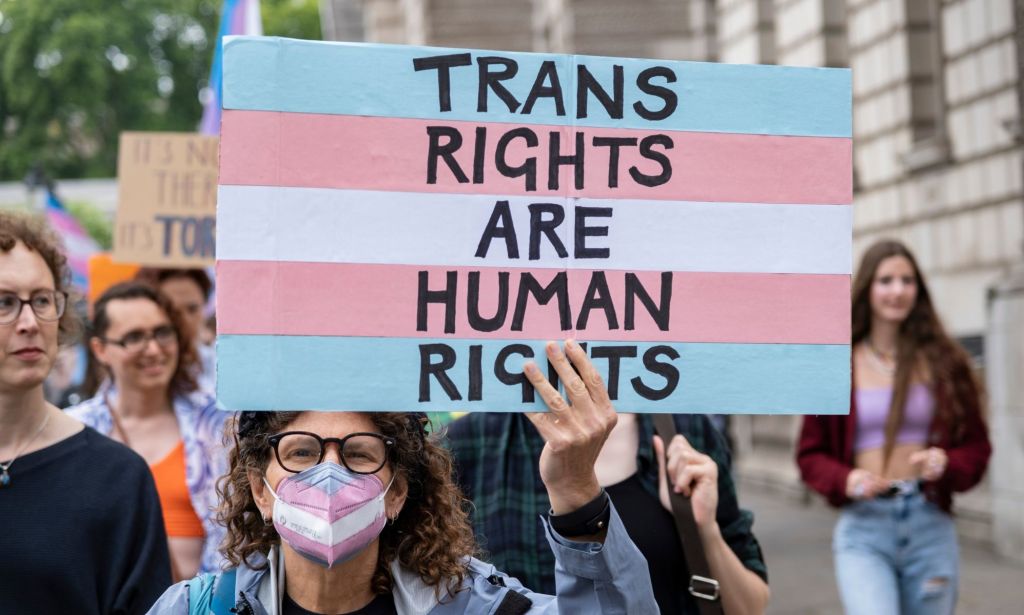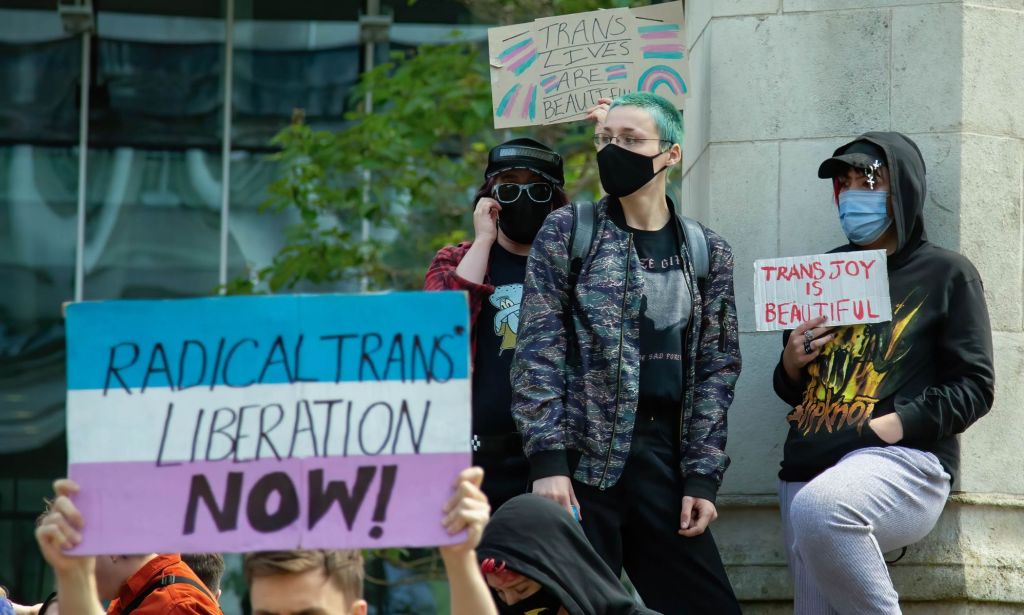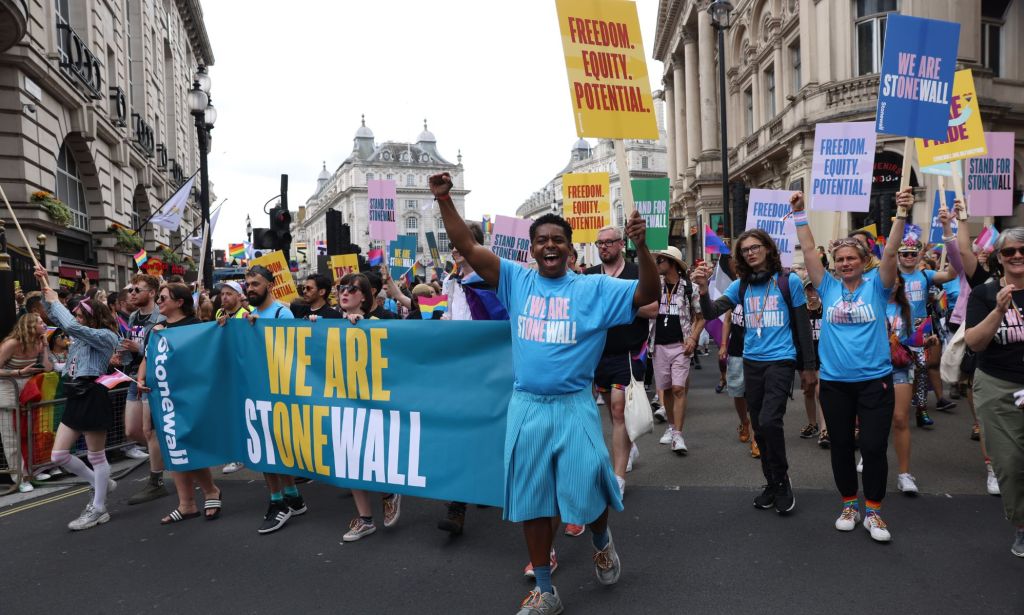Please Rishi Sunak – don’t play games with trans peoples’ lives, Stonewall chief pleads

Rishi Sunak. (Getty)
The UK government appears intent on challenging Scottish gender recognition reform, either by blocking legislation passed in Holyrood that would remove barriers for trans people, or by refusing to accept Gender Recognition Certificates issued in Scotland. Stonewall CEO Nancy Kelley explains for PinkNews why such a move would be so calamitous.
The trans population is a tiny minority. The 2021 Census recorded that just 0.5 per cent of the population of England had a gender identity that was different from their sex registered at birth – 262,000 people.
Despite being a small population, trans people live in every community, every constituency in the UK. They are our classmates, our colleagues, our friends and our family. Trans people need positive action from the government to help them thrive, not to be treated as social pariahs.
Size matters. It doesn’t mean that trans people aren’t important and don’t need protection and respect; history tells us that small populations have been persecuted by some of the world’s most regressive regimes. But it does call for a proportionate response when making policy and political decisions.
This is particularly important when we consider the UK government’s current direction of travel: restricting the range of countries whose gender recognition process it recognises and intervening to prevent implementation of the Scottish government’s Gender Recognition Bill.
These moves are obviously disproportionate and would be a serious mistake for the prime minister on a number of grounds.
More than anything else it disrespects trans people, who are human beings like all of us, trying to get on in their lives and fulfil their potential.

Kemi Badenoch could refuse Scotland-issued gender recognition certificates
While a de-medicalised gender recognition process was the policy of Theresa May’s government, and has the support of all other major parties in England and Wales, it is not the policy of the UK government. But it is the international standard that rights-respecting countries are moving towards, with 30 countries adopting this approach over the last decade.
The equalities minister’s move to review the list of countries where the UK government has reciprocal arrangements for legal gender recognition, implying that the 14 countries on this list that have adopted a de-medicalised approach are ‘less rigorous’, is likely to cause diplomatic strife with some of our closest trading partners and allies including Canada, Australia, New Zealand and most of the United States.
Unlike our current UK government, these countries take pride in recognising and respecting trans people, and view LGBTQ+ rights as a key pillar of their international engagement.
The list does not include the Republic of Ireland, for which there are separate, extensive and important reciprocal arrangements as part of the Common Travel Area.
Ireland adopted a de-medicalised process of legal gender recognition almost eight years ago. The 2021 census recorded 325,000 people born in the Republic of Ireland living in England and Wales (648,000 were born in Scotland) and at no point in those eight years has there been any evidence that this causes harm, or even confusion.

The Gender Recognition Reform Bill in Scotland – the spark for this unprecedented reaction from the UK government – was one of the most scrutinised in Scotland’s history. It took a period of six years from announcement to passing with a decisive majority of MSPs from all major parties in Scotland.
It was subject to two major consultations, 10 weeks of scrutiny in the Scottish parliament, and almost 150 amendments which were carefully considered by Scotland’s elected representatives.
This process gave parliamentarians the time to consider the important implications of the Bill and how it interacts with key pieces of legislation that affect England and Wales too, like the Equality Act.
Block Royal Assent would be a huge and calamitous move.
Stonewall CEO Nancy Kelley
Time after time, MSPs concluded that recognising trans people without a two-year long, invasive and medicalised process does not impact on the operation of the Equality Act, which has been guiding employers, schools and service providers in the three nations since 2010.
Safeguards were rightly and extensively considered. The legislation is firmly within the competence of the Scottish parliament and Scottish government.
To seek to block Royal Assent for the bill – which Rishi Sunak’s cabinet is said to be considering this week – would be a huge and calamitous move.

Blocking Scotland’s gender reform would be unprecedented
In more than 23 years, the UK government has never used its powers to block legislation passed by the Scottish parliament. To do so over a piece of legislation that affects such a tiny minority, that has been through such extensive scrutiny, would significantly undermine devolution settlement. It is an overstep that could have implications for the future course of the United Kingdom.
This course of action appears to be driven by prejudice. It sends a message to trans people that they are not valued or respected as citizens. And it underscores how out-of-step the UK government is with major employers across the country, and around the world, who are proud to count trans people as a valued part of their workforce. Every week Stonewall works with hundreds of these employers, who are frustrated by the lack of constructive support from the UK government.
Whether we care about trans people themselves, the UK’s global standing, the devolution settlement, our relationship with Ireland, or the views of business and the community, these moves are narrow political game playing, completely out of step and out of proportion with the compassionate approach promised by Rishi Sunak.

